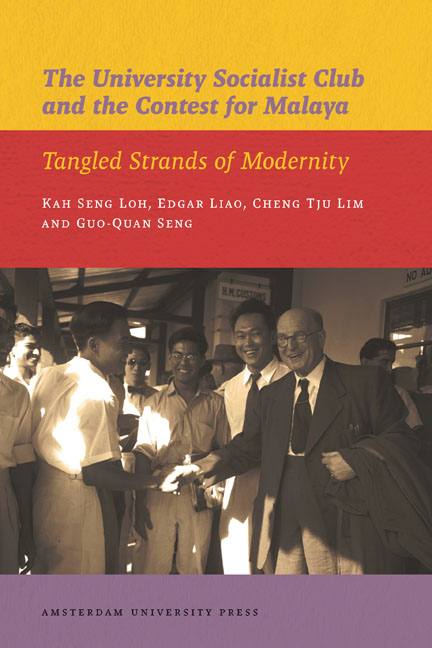Book contents
- Frontmatter
- Dedication
- Contents
- Acknowledgments
- List of Photographs
- Abbreviations
- 1 The Socialist Club and the Modernity Project
- 2 Awake in the Bowl of Night
- 3 The Fajar Trial
- 4 Visionary of the Nation, Voice of Stifled Malayans
- 5 A Beacon of Light on the Campus and Beyond
- 6 Frankly Partisan in the Struggle for Student Leadership
- 7 The Shadow over the Club
- 8 Resisting Malaysia, Swansong for Malaya
- 9 Long Night after Coldstore
- 10 In Defence of University Autonomy and Student Rights
- 11 Entwined Memories and Myths
- Conclusion: Modernity in Singapore and Malaya Reconsidered
- The University Socialists: Biographical Sketches
- Timeline of Events
- Notes
- Bibliography
- Index
- Publications Series
7 - The Shadow over the Club
Published online by Cambridge University Press: 21 January 2021
- Frontmatter
- Dedication
- Contents
- Acknowledgments
- List of Photographs
- Abbreviations
- 1 The Socialist Club and the Modernity Project
- 2 Awake in the Bowl of Night
- 3 The Fajar Trial
- 4 Visionary of the Nation, Voice of Stifled Malayans
- 5 A Beacon of Light on the Campus and Beyond
- 6 Frankly Partisan in the Struggle for Student Leadership
- 7 The Shadow over the Club
- 8 Resisting Malaysia, Swansong for Malaya
- 9 Long Night after Coldstore
- 10 In Defence of University Autonomy and Student Rights
- 11 Entwined Memories and Myths
- Conclusion: Modernity in Singapore and Malaya Reconsidered
- The University Socialists: Biographical Sketches
- Timeline of Events
- Notes
- Bibliography
- Index
- Publications Series
Summary
The contestation on campus between the Socialist Club and its critics was not the only arena in which the Cold War had a defining effect. Surveillance, harassment and curtailment of the left, driven by fears of communist manipulation and empowered by the Emergency and successor legislation, were not incidental to the Second Malayan Spring experiment, but integral to it. The surveillance of the University Socialists by the Special Branch (after independence, the Internal Security Department, ISD) throughout the 1950s and 1960s was just as pervasive, and ultimately more harmful to the Club's activism. The early shadowing of the Club from its formation which eventually led the colonial government to make the Fajar arrests in 1954 was merely the first instance of this systematic yet highly speculative regime of surveillance. However ill-conceived in hindsight, the British had made the dawn arrests in May because they had perceived a political bridge formed between the English- and Chinese-educated students in the immediate aftermath of the “513 Incident”. This convergence was, to the state, unacceptable. The trial only served to reinforce the connections between the two groups. Similarly, as the Special Branch continued to monitor the Club at the University of Malaya for the remainder of the decade, its concern about this political transgression resulting from the alliance of the English- and Chinese-educated groups remained unabated. The state's surveillance generally focused on what was perceived, erroneously or otherwise, to be the more overtly communist, Chinese-controlled or mass-based political groups, including the Malayan Communist Party, Barisan Sosialis, the Middle Road trade unions, old boys’ associations and Chinese middle school and Nanyang University student activism. Former Club member Lee Ting Hui, who did a cautious study of the communist united front in post-war Singapore based on classified Special Branch files, identified Albert Lim Shee Ping and Linda Chen Mong Hock as the only Malayan Communist Party members in the Socialist Club. The Branch concluded, Lee noted, that the Club was not a mass organisation of the party. Nevertheless, the Club, as an articulate and critical voice of the university student community, occupied a key node in the mental map of local politics which oriented the thinking of the intelligence services and their political masters; it is striking that English-educated university students, often deemed to be politically apathetic, were closely watched at times.
- Type
- Chapter
- Information
- The University Socialist Club and the Contest for MalayaTangled Strands of Modernity, pp. 153 - 166Publisher: Amsterdam University PressPrint publication year: 2012



